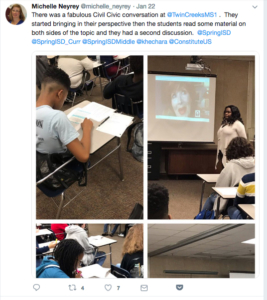Book a Civil Civic Conversation For Your School
The George Washington – We Are All Americans – Speaking Initiative
Constituting America’s program, “How to Have a Civil Civic Conversation,” gives your students the opportunity to learn about how to have a meaningful Civil Civic Conversation. In America’s current divisive atmosphere, it is important for students to learn how to listen and become informed about opposing points of view. Through our Civil Civic Conversation process, students will discover how to be an active part of the political future of our country, exercising their first amendment rights, protected by the U.S. Constitution.
Two passionately politically opinionated students from opposing points of view will debate a difficult timely topic chosen in consultation with you, the teacher, with the class observing. The entire classroom will then be involved, learning new skills by reading two points of view on the chosen topic in order to assess the alternative point of view. This will be followed by watching a peer to peer video, discussing dialogue techniques, and then re-engaging in conversation in a newly informed calm manner.
Students will put their Civil Civic Conversation skills to practice in the final segment of the program where they will compromise in order to create a bill simulating the process in U.S. Congress. After class participation and writing their own bill, the two starring students who started by passionately opposing each other politically, will now present their bill to their U.S. Representative, having found common ground.
Click here to download our Civil Civic Conversation Flyer!
Watch our Peer to Peer Teaching Video – “How To Have A Civil Civic Conversation” below!
“Thanks again for helping to make this happen. I think the program is great and my students got a lot out of it….Lippman 7th and 8th graders addressed the issue of gun violence and the 2nd Amendment by grappling with the question: Should more gun control laws be enacted? Through an examination of opposing viewpoints, students examined perspectives that were not their own in order to truly understand the position of the other side. At the end, they had some common ground points that provided a foundation for developing a piece of legislation. Students in the 5th and 6th grade followed the same formula to address the question of whether or not students’ personal digital devices should be permitted in the classroom. At the end of their Civil Civic Conversation, they had developed the beginnings of a new school policy on personal technology.”-Matthew G. Russ, Humanities Teacher, Curriculum & Student Affairs Coordinator, The Lippman School, Akron Ohio
“The civil conversations discussion held by Constituting America was simply amazing! Students were challenged with the opportunity to research evidence that supported their personal views on a sensitive topic, listen to their classmates who had opposing views on the topic, and attempt to create a solution on how they as American citizens could create legislation on the matter for the greater good of the republic. The learning didn’t stop there! The students and myself took the practices we learned during civic conversations and implemented them into our classroom practices. I would recommend this activity to anybody. It was outstanding!!!”-Eboni Jenerette, Teacher, Twin Creeks Middle School, Spring ISD

“when you have a civil conversation with somebody, you need to learn how to conduct yourself and how to come into the conversation smooth and calm”
“so you have to find something that you agree with them, even if it’s only like 5% of the thing that you agree on, you have to find something so you can still be friends”
“don’t always just judge them based on their opinion! you can find those gray areas where maybe you agree on something”
“i learned how to find common ground with them”
“we thought about how the other person feels and their points, instead of being stuck on how we feel and what we think is true”
“you have to acknowledge all of their opinions and disagreements”
“today i learned to really listen to people and not just listen to answer”
“and if you don’t know about something having a civil conversation with someone is a great way to learn it”